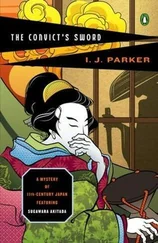I. Parker - The Crane Pavillion
Здесь есть возможность читать онлайн «I. Parker - The Crane Pavillion» весь текст электронной книги совершенно бесплатно (целиком полную версию без сокращений). В некоторых случаях можно слушать аудио, скачать через торрент в формате fb2 и присутствует краткое содержание. Жанр: Исторический детектив, на английском языке. Описание произведения, (предисловие) а так же отзывы посетителей доступны на портале библиотеки ЛибКат.
- Название:The Crane Pavillion
- Автор:
- Жанр:
- Год:неизвестен
- ISBN:нет данных
- Рейтинг книги:5 / 5. Голосов: 1
-
Избранное:Добавить в избранное
- Отзывы:
-
Ваша оценка:
- 100
- 1
- 2
- 3
- 4
- 5
The Crane Pavillion: краткое содержание, описание и аннотация
Предлагаем к чтению аннотацию, описание, краткое содержание или предисловие (зависит от того, что написал сам автор книги «The Crane Pavillion»). Если вы не нашли необходимую информацию о книге — напишите в комментариях, мы постараемся отыскать её.
The Crane Pavillion — читать онлайн бесплатно полную книгу (весь текст) целиком
Ниже представлен текст книги, разбитый по страницам. Система сохранения места последней прочитанной страницы, позволяет с удобством читать онлайн бесплатно книгу «The Crane Pavillion», без необходимости каждый раз заново искать на чём Вы остановились. Поставьте закладку, и сможете в любой момент перейти на страницу, на которой закончили чтение.
Интервал:
Закладка:
“Thank you, sir.” Saburo bowed and left.
Akitada felt more than ever inadequate for what lay before him. Never mind the alleged suicide of some woman or the violent murder of a moneylender. Those were other people’s problems. He had neglected his own duties while reprimanding Saburo. With a sigh, he got up and went to look at the accounts. Saburo had indeed kept them faithfully.
But he was shocked to see how very little gold was left. Running his eyes over the entries, he saw the large payments that had been made for Tamako’s funeral and a number of bills the household had incurred in his absence. Missing were his usual salary payments to offset such big expenses. Since he had abandoned his position in Kyushu, he had not drawn his salary for it or for his large travel expenses. Meanwhile, income from his farm outside the capital and from some land he still owned in the north from his service as governor in Echigo was not expected until after the fall harvests.
Worse, apparently none of his people had received any pay since his return. Saburo had not told him, perhaps because he had assumed that his master would check the accounts.
No wonder they were all so eager for him to get over his grief.
No, that was unjust. None of them was doing this for the money. He was being unfair to the people who served him, just as he had been unfair to his children. He closed the account book.
For a moment he went out on his veranda and stared at the wet greenery without seeing it. He could not do as he wished. He could not even do as they had hoped he would, that is by letting himself be distracted by an investigation into a suicide or a murder. He must go back to work.
He went inside and took his resignation from the box. Tearing it up, he dropped the pieces on the glowing charcoal under his water pot and watched it flare up and burn.
Suddenly, he had the strange feeling that he was not alone. The hairs on the back of his neck bristled as he listened. Had he heard a shuffling step? A dry cough? He looked around wildly, half afraid and half hopefully. The room was empty.
And yet he knew he was not alone. Perhaps the beneficent spirits of the dead who had loved people stayed around or paid their visits when needed.
“How are you, old friend?” he murmured into the dim air. “You always know, don’t you?”
If old Seimei had still been with him, he knew what he would have told him. “Fire does not burn in a jar,” he would have said. And then he would have quoted Master Kung-fu-tse on the duty of a gentleman to keep active and look after his people.
Locking himself away in his room to mourn Tamako had been wrong. It had been a form of escape. He was alive, and Tamako had trusted him to look after the children and their people. Now he must make an effort for them. However distasteful it was, he must return to work. It would mean begging forgiveness and pleading for even the most humble position.
He would start with a visit to the ministry and a talk with Fujiwara Kaneie.
12
Saburo felt resentful. He did not think he had deserved his master’s anger, and though he tried to make allowances, the scene rankled. The next morning, he went to look for Tora or Genba.
Genba was in the stable, feeding the horses. He looked glum. “I don’t know what we’ll do for food for these animals,” he said to Saburo. “You’ve got to talk to the master. I need money to buy more hay and straw.”
Saburo perched on an upturned water bucket. “I can’t talk to him. I just told him about a murder in the city and a poor blind girl the police arrested, and he got very angry, saying I had no business meddling in police affairs and neglecting my chores. I haven’t been neglecting my chores.”
Genba nodded. “He’s not well. We’ve got to be patient. But money is another matter. We’ll all starve soon along with the horses. Cook says she’s been cutting back on her marketing. You’ve got to talk to him.”
“I can’t. At least not just now.”
Genba sighed. “We haven’t told him our news yet.”
Saburo nodded. He knew that Genba and Ohiro were expecting a child in another three months and that they had been afraid to tell the master.”
“We can’t wait much longer. Ohiro shows already.”
Saburo nodded again. They looked at each miserably, then Saburo got up. “I’ll see what Tora thinks.”
“Oh, Tora’s in great spirits. He got the master to inspect some place where a lady hanged herself. The mansion belongs to one of the master’s friends.”
Saburo’s resentment grew by a few notches. So Tora got a favorable hearing. Maybe because that death concerned one of the good people. He spat into the straw and left.
Tora was on his way out. Of course, he looked happy, Saburo thought sourly. Here he lived in a comfortable house with a pretty wife and handsome son, and his master favored him above all his other retainers. Even Genba, for all his grumbling, was a lucky family man. Only he, Saburo, had neither wife nor family.
And now not even a girlfriend any longer.
“Hey, Saburo. Why the long face?” Tora grinned at him.
“I can’t seem to do anything right.” Saburo’s resentment grew. Tora could do no wrong. Fortune smiled on him. “The master just laid into me because I told him about a murder in the city. All I wanted to do was to get him interested again. You know he hasn’t been out of that room in months and has made no effort to return to work. And we’re almost out of money. I don’t know what to do. Genba’s worried about feed for the horses. When I told him about the murder, the master accused me of gallivanting about on my own business instead of doing my chores. But I’d stayed up nights to work on the account so as not to be in his way. Frankly, Tora, I don’t know what to do any more.”
As he poured out his pent-up feelings, Tora’s face gradually lost its smile. Now the handsome Tiger scratched his head. “It’s that bad about the money?” he asked, getting to the most urgent of the problems.”
Saburo nodded.
“I think it’ll be all right,” Tora said cautiously. “He’s starting to take an interest again. Sorry you got a lecture. It’s probably all been a bit much for him. See, I got him to look into the suicide of this Lady Ogata this morning, and then his sister came. She always makes him irritable. What’s this about a murder in the city?”
Saburo felt a little ashamed of having blamed Tora for being the master’s favorite. He said, “I’m sorry, Tora. It’s not your fault. I’ve had a bad day over this murder of a moneylender in one of the bathhouses. The police arrested one of Shokichi’s friends, a blind shampoo girl who worked at the Daikoku-yu. Shokichi broke off with me because she thought I didn’t do enough to help her friend. I hoped maybe the master might look into it, but you’d already got him to look into your case.” He sighed.
“It’s not my case. Lord Nakatoshi told the master about it. As it turns out, some of the master’s friends have been plotting to get him out of the house. And it worked, too. I just happened to be the one to go with him. I tell you what, Saburo. I was about to go see Superintendent Kobe to report. Why don’t you come along? You can talk to him about your blind shampoo girl.”
Saburo accepted gratefully. He was experiencing a strong feeling of kinship with Sachi and the poor schoolmaster. Once he had been like them: poor and therefore preyed upon by everyone. The good people looked through you as if you didn’t exist. Your presence appalled them and offended their sensibilities, so they closed their eyes to your suffering. The rich merchants drove you from their doorstep, and the rest stole from you or took out their frustrations by beating you up.
Читать дальшеИнтервал:
Закладка:
Похожие книги на «The Crane Pavillion»
Представляем Вашему вниманию похожие книги на «The Crane Pavillion» списком для выбора. Мы отобрали схожую по названию и смыслу литературу в надежде предоставить читателям больше вариантов отыскать новые, интересные, ещё непрочитанные произведения.
Обсуждение, отзывы о книге «The Crane Pavillion» и просто собственные мнения читателей. Оставьте ваши комментарии, напишите, что Вы думаете о произведении, его смысле или главных героях. Укажите что конкретно понравилось, а что нет, и почему Вы так считаете.












